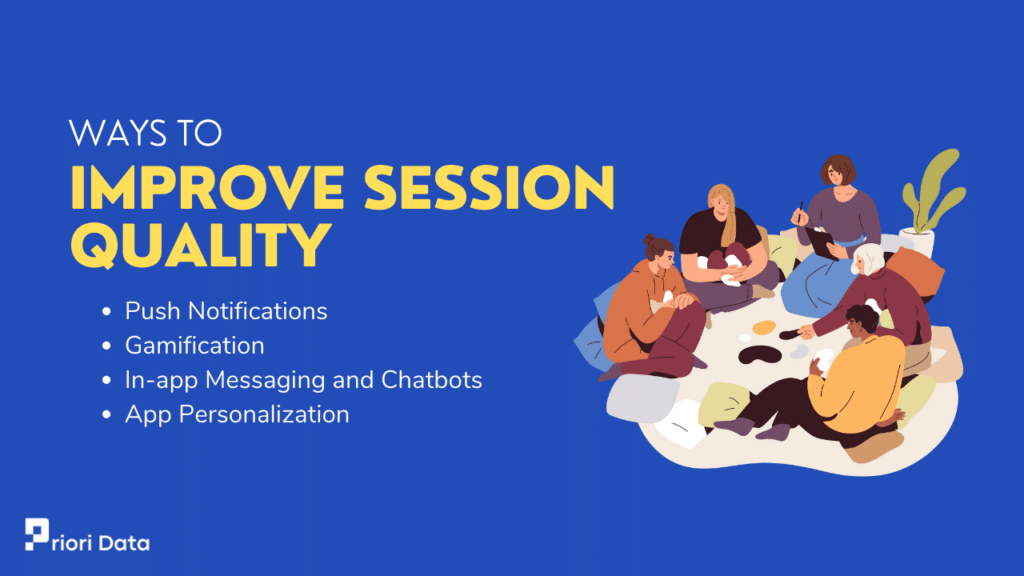A session refers to when a user opens the app and engages with it for a certain period of time.
The app can track the user’s interactions with the app to provide a better user experience.
Whenever the user opens an app, they start a new session. It collects data about pages they visit, how long they stay on the screen and user actions. This entire data get stored in the app’s database to understand the user’s usage.
In the context of mobile apps, a session is a period of time during which a user interacts with an app.
That can be a few seconds or can be several hours, depending on the app and the user’s needs. During this time, the app records the user’s activities, preferences, and interactions.

Why are sessions important?
Sessions are important for understanding user behavior from time to time. Analyzing the data from various sessions can identify patterns and trends of a user.
This makes app developers and marketers improve their app performance. This can help businesses to take optimal decisions about new features to the app’s design.
For Example: If app developers notice that users spend their time on a specific screen. It means that they tend to develop new features of the app. If they notice it vice-versa that users are skipping their screen. It means that they are not interested, so they can remove it or redesign it to make it more attractive.
The session includes session data along with data usage. It gains valuable insights into user behavior and interests.
They can track the most used time and their most popular content in the app. By using this data, we can optimize the app, improve user engagement, and increase app revenue.
Does longer session time always mean higher engagement of users?
While longer app session times can represent a positive sign for user engagement. But, it is not always applicable, especially in the context of mobile apps.
Users can use various apps at a time, switching back and forth between their screens of the app.
Sometimes, users may experience technical issues they may spend more time than usual. In such cases, the longer session time may not be an indicator of high engagement with the app.
Consider, if you are maintaining a youtube channel, then a longer session time is a good thing. In contrast, if you are running a food delivery app then a longer session is not a good thing.
It represents that users are experiencing problems that result in negative feedback. So, a longer session depends on their own industry-level standards, not the same for all.
How do sessions work in terms of mobile apps?
In mobile apps, a session refers to the period of time a user’s activeness in the app. Let’s see the concept of how sessions work in mobile apps:
When a user opens an app on their mobile device, it refers to starting a new session. The data such as the time and date the session started, and actions made on them gets recorded at the backend. The interaction of the user gets tracked by the actions made on the screen page.
As the user interacts with the app, the app collects data about their behavior and actions. The data collected during the session gets stored in the app’s database. They collect the necessary information required but remember not to provide sensitive data. We can generate reports about the progress of their app.
The session gets ended when the user closes the app or becomes inactive for a certain time. The gathered data can identify the areas to improve for providing positive feedback.
What are some of the ways to improve session quality and boost app engagement?
Improving session quality and boosting app engagement is essential for retaining existing users.
Even for driving more revenue in the mobile app market.
Let’s see some common ways to achieve this.

1. Push Notifications
Personalized push notifications can increase user engagement by reminding users of their apps. Drawing the attention of users to encourage them to do actions within the app.
By providing discounts and offers, gain their attention towards your app. Customize the push notifications with the preferences and previous history of users.
2. Gamification
Introducing gamification elements such as badges, leaderboards, and rewards in the app. As games are very popular nowadays so, it is easy to attract users with them.
It can incentivize users to engage with the app and increase their session length. Rewards can be in the form of in-app currency, exclusive content, or other benefits. As a result, the user tends to interact with your app which boosts higher engagement.
3. In-app Messaging and Chatbots
In-app messaging and chatbots can provide users with personalized and real-time support. It improves their app experience and increases the engagement of users.
They provide clear and concise tutorials that can help new users understand the app. Users can also share their feedback, report issues, and make suggestions for improvements. It increases the likelihood of users returning and engaging with the app.
4. App Personalization
Personalization of the app increases the users and the session length of the app. It is a tool for promoting your marketing services via your app. For example, if you are running an online shopping store.
Personalizing users with recommendations and offers can help to sell more items. The main motive is to increase downloads and to achieve loyal and satisfied users.
Make sure to ensure that the app is running, without any crashes or other technical issues. It is very critical to user satisfaction and engagement. Regular monitoring of the app helps to improve session quality and retention.
FAQs
Ques 1. Why are sessions created?
Ans. Sessions are created to track the user’s activity in mobile apps. It stores the app data during their current interaction with the app.
Ques 2. What data is stored in the session?
Ans. Session data includes login and temporary data related to the user’s current session.
Ques 3. Which is better session or cache?
Ans. A session stores temporary data that is accessed within a single user session.
while a cache stores frequent data which can be reused across many user sessions. In the context of mobile apps, it depends on the specific use case of the business.
Ques 4. Why do we store sessions?
Ans. To maintain the user data and preferences across the interactions within the app.
Ques 5. How are sessions maintained?
Ans. Sessions in mobile apps are maintained through the use of session tokens or cookies.






